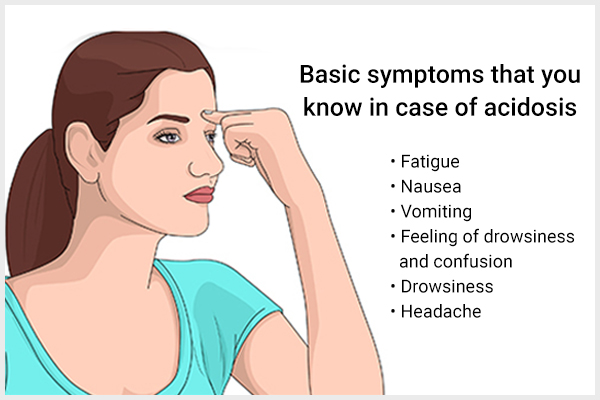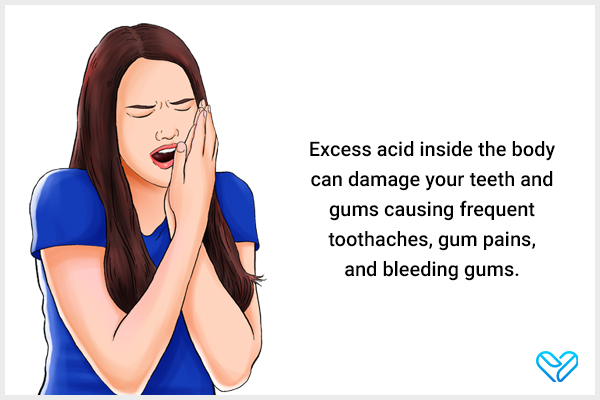In this article:
Your body contains both acidic and alkaline (base) substances and a balance is maintained between them to create a near-neutral pH (7.4) in the body. But sometimes, the system is thrown out of gear and an acid build-up is seen in the body fluids resulting in the syndrome called acidosis.

Acidosis is usually the result of an underlying pathologic condition. Hence visit your doctor to test whether you have too much acid in your body. According to the Stat Pearls, (1) the normal pH of body fluids in human beings is between 7.35 and 7.45, a body fluid at pH 7.35 and below is acidemia, and a pH above 7.45 is alkalemia.
Types of Acidosis
Acidosis can be further subdivided into two types:
1. Metabolic acidosis
Metabolic acidosis occurs when your blood starts losing too much bicarbonate (base) or accumulates too much acid. (2) Here are some common causes:
- Ingestion of a substance that is acidic, or can be broken down (metabolized) to, an acid good alcohol (methanol), antifreeze (ethylene glycol), or large doses of aspirin acetylsalicylic acid. Many other drugs and poisons can cause acidosis.
- Abnormal metabolism such as advanced states of shock or over-exercise (lactic acidosis), or poorly controlled type 1 diabetes mellitus (ketoacidosis) can also cause metabolic acidosis.
- Kidney failure also results in metabolic acidosis, since the kidneys are not able to excrete acid in the urine.
- In severe diarrhea, the body loses too much bicarbonate (base) resulting in metabolic acidosis.
2. Respiratory acidosis
Respiratory acidosis occurs when the lungs are unable to expel carbon dioxide properly, which then builds up inside the blood. (3) Here are some common causes:
- Consumption of opioids (narcotics), alcohol, or sleep-inducing drugs (sedatives). These cause slow breathing, resulting in a low level of oxygen in the blood.
- Disordered breathing due to sleep apnea can cause temporary respiratory acidosis.
Basic Symptoms That You Know in Case of Acidosis

In mild metabolic acidosis, there are no symptoms but you may experience the following: (4)
- Fatigue
- Nausea
- Vomiting
- Faster and deeper breathing to expel more carbon dioxide
- Feeling of drowsiness and confusion
If left untreated, the condition could worsen leading to shock, coma, and death. (4)
The earliest symptoms of respiratory acidosis are as follows: (4)
- Drowsiness
- Headache
As the concentration of oxygen in the blood falls, the patient may go into a stupor and coma leading to eventual death. (4)
The symptoms of long-term acidosis in the body that you are generally unaware of:
1. Flushing of skin and delayed wound healing
The natural pH of human blood ranges between 7.35 and 7.45 which can be categorized as neutral to slightly basic, but the outermost layer of the skin is more acidic than that with a pH value of 4–6. (5) This is known as the skin’s acid mantle which helps inhibit the growth of bacteria and retain moisture in the skin. (6)
An acidic environment inside the body can make one prone to skin inflammation that can manifest in the form of eczema, acne, and skin flushing. (7) Acidosis is also known to cause bacterial and toxin overload inside the body which can make your skin turn reddish.
Your body needs to maintain a neutral pH in the blood and tissue to facilitate proper wound healing. The acidic substances in the body help stimulate collagen production whereas the alkaline substances promote resurfacing of a wound with new epithelium. (7)
However, too much acid in the body can hinder the regeneration of epithelial tissue which can delay wound healing.
2. Dental problems

Excess acid inside the body can damage your teeth and gums causing frequent toothaches, gum pains, and bleeding gums. (8)
The acidic buildup erodes the dental structure to cause cavities and tooth sensitivity. The human body has an inherent mechanism to counter metabolic acidosis. This involves extracting alkaline calcium salts from the bones and teeth to alkalize the body.
As your teeth lose more and more calcium, they become weak, sensitive and prone to falling out.
3. Weak bones
The body has several internal mechanisms to using adjust fluctuations in its pH and keep it within the normal range. One such mechanism involves drawing out the alkaline salts of calcium from the bones to neutralize excess acid in the blood.
However, the depletion of calcium from the bones renders them weak and brittle resulting in osteoporosis or osteopenia overtime. Western diets majorly constitute acidic foods like beef, dairy products, caffeine, and carbonated beverages which can increase the acid load in the body.
But young people with normal renal function tend to excrete most of this excess acid through urine. In such cases, other factors like gender, age, physical activity, or lack thereof, play a much more significant role in causing bone degeneration.
Older adults, on the other hand, tend to suffer from diminished renal function which hinders their ability to eliminate excess acid from the body. Plus, they have lower bone mass which means less calcium to counter the excess acid. In such cases, avoiding acidic foods and adopting an alkaline diet can help preserve or improve your bone health. (9)
4. Insomnia, anxiety, and depression

Glutamate is a free amino acid which is present in concentrated amounts within the brain between multiple metabolic pathways. (10) The accumulation of acid in brain cells hampers their ability to function and communicate with each other. This can lead to insomnia, anxiety, depression, and decline in memory.
Brain is the motherboard of the body which controls every other organ system and physiological process. So, any problem with the working of the brain and the nervous system due to acidic build-up will adversely affect the rest of the body.
Acidic buildup in the body also paves the way for gastroesophageal reflux disease (GERD) which is characterized by the regurgitation of stomach acid into the esophagus or food pipe. There is a valve at the lower end of the esophagus which connects it to the stomach, called the lower esophageal sphincter (LES).
The LES remains tightly closed at all times and only opens to allow swallowed food and drinks to pass into the stomach. But if this valve becomes dysfunctional or damaged, it relaxes for prolonged periods allowing the acidic secretions of the stomach to flow back into the food pipe causing heartburn, chest pain, and general discomfort. (11)
GERD patients often suffer from anxiety, depression, and sleep disturbances due to their chronic condition and the symptomatic distress it entails. It is important to equip these patients with therapeutic measures and lifestyle interventions to manage their stress and anxiety in order to lead more productive and fulfilling lives. (12)
5. Excess weight
People with an acidic body tend to put on weight more easily and find it hard to lose weight. This is because the body stores the excess acid in the fat tissues where it adheres to your fat cells.
Research has shown that a growing number of obese and overweight people in the United States suffer from metabolic acidosis. (13)
How to Fix Acidosis?

An important approach is to follow an “alkaline” diet. (14) Read on to know more about how you can alkalize your body naturally.
1. Eat plenty of vegetables
The alkalizing effects of vegetables is due to the presence of potassium salts which combine with the excess acid in your body neutralizing it and reducing the acidosis. (15)
Broccoli, bitter gourd, cucumber, spinach, green pepper, and green asparagus are some of the known alkalizing vegetables. So, try to consume these regularly or take them in the form of juice. (16)
2. Increase consumption of whole grains, cereals, and nuts
Besides being alkalizing these foods are natural sources of calcium and magnesium, the deficiency of which could lead to acidosis. (16)
3. Drink the juice of citrus fruits
Citrus fruits like lemon though acidic outside the body have an alkalizing effect on being metabolized. Dietary citrate from the citrus fruit is absorbed in the intestine and converted to bicarbonate which is an alkali. Thus, this neutralizes the excess acid in your system. (17)
Hence beginning the day with the juice of one lemon in warm water does wonders to fix your acidosis.
4. Consume alkalizing fruits and vegetables
In a 2014 study reported in the American Journal of Nephrology alkalizing fruits such as oranges, strawberries, apples, apricots, peaches, pears, and raisins along with alkalizing vegetables such as cauliflower, carrots, lettuce, spinach, tomatoes, eggplant, and zucchini were given to 108 kidney disease patients suffering from metabolic acidosis and the effect on kidney disease was monitored over a three-year period. The results showed neutralization of metabolic acidosis and an improvement in kidney function. (18)
5. Include fruits and vegetables in your diet
Including plenty of fruits and vegetables in your diet is thus a good natural remedy to treat/prevent acidosis. (19)
6. Drink plenty of water
Keeping yourself hydrated is very important to dilute out the excess acid and excrete it in the urine. Consumption of mineral water with different levels of bicarbonate has been shown to reduce the dietary acid load in normal individuals according to a 2019 study carried out on 129 participants. (20)
Diagnosis of Acidosis

Usually, blood tests are done to measure pH, carbon dioxide levels, and bicarbonate levels in the blood.
The immediate line of treatment consists of intravenous administration of bicarbonate but this is not enough. The doctors carry out more tests to identify the underlying cause of the acidosis and prescribe suitable interventions to treat it. (4)
Most-Asked Questions About Acidosis
What are some of the complications resulting from metabolic acidosis?
Metabolic acidosis can lead to osteoporosis, kidney damage, muscle loss or wasting, high blood sugar, and risk of death.
What is the best diet for preventing acidosis?
A plant-based diet rather than an animal-based diet can help prevent acid levels from increasing in the body. Eating plenty of fruit and vegetables each day also helps.
Is hair loss also a sign of too much acid in the body?
Excess acid in the body is not directly linked to hair loss but it can play a role in weakening your hair by disrupting proper nutrient absorption. Your hair needs protein and other nutrients to stay strong and healthy.
Do we experience muscle cramp when our body is too acidic?
Working out a muscle vigorously and not giving it some much needed rest thereafter can lead to the buildup of lactic acid in the targeted area. The lactic acid can irritate the muscle to cause cramps. (21)
Final Word
Acidosis is a high level of acid in the body, which causes different complications if left untreated. Dietary and lifestyle changes are useful in preventing acidosis.
Diets high in animal protein and processed junk foods can cause acidosis in the body. Hence these foods need to be avoided or taken in moderation. If a disease or health condition is causing acidosis, treating the condition can help lower acidity in the body.
Above all, a combination of exercise, drinking plenty of water, and consuming plenty of fruits help in lowering acidity in the body.
- Was this article helpful?
- YES, THANKS!NOT REALLY


